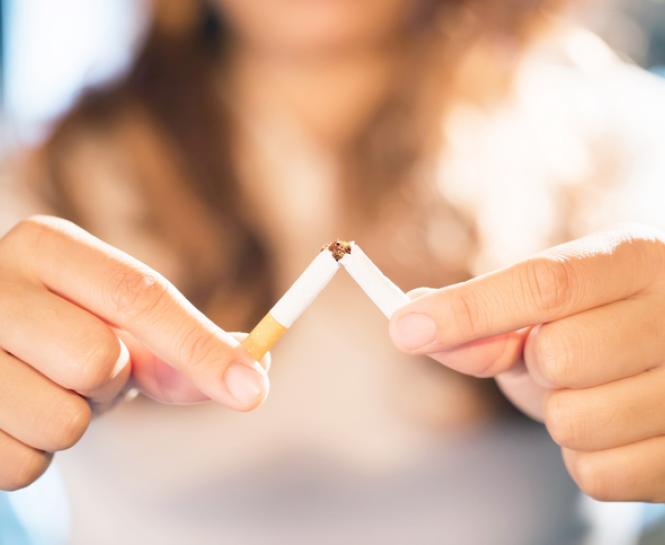Sharad Chandrika, MD, director of interventional pulmonary medicine at Catholic Health, addresses the most common myths about lung cancer.
Lung cancer is the second most common cancer in men and women. The American Cancer Society's estimates for lung cancer in the United States for 2023:
- About 238,340 new cases of lung cancer (117,550 in men and 120,790 in women)
- About 127,070 deaths from lung cancer (67,160 in men and 59,910 in women)
But thanks to ongoing research, doctors and their patients have new options to treat this disease.
Myth: Only smokers get lung cancer
Fact: Smoking is the most significant risk factor, but there are others. Radon is the first cause of never-smokers and the second in smokers in the United States. Emitted by rock and soil, it can seep into homes and other buildings. Testing is available through state governments. Air pollution, asbestos, arsenic, diesel exhaust, benzene, formaldehyde, and some forms of silica and chromium are other factors that could increase a person’s lung cancer risk. Family history has also been shown to play a role as well.
Myth: Secondhand smoke does not increase my risk of lung cancer
Fact: Non-smokers exposed to secondhand smoke at home or work increase their risk of developing lung cancer by 20% to 30%. Secondhand smoke causes more than 7,300 lung cancer deaths among U.S. non-smokers annually. Several studies suggest that the amount of cancer-causing chemicals in tobacco smoke is higher in secondhand smoke than in smoke inhaled by smokers. According to the National Cancer Institute (NCI), there is no documented "safe" exposure to secondhand smoke.
Myth: I’ve been diagnosed with lung cancer. Quitting will not make a difference.
Fact: Kicking the habit can make treatment more effective and lower the risk of dying from causes other than lung cancer. Researchers have estimated that 75% of those who quit smoking would be alive three years after diagnosis, compared with 66% of those who continued smoking. Also, people who quit tolerate their treatment better and have fewer side effects. Quitting smoking improves how long people live, regardless of whether they have been mild-to-moderate or heavy smokers.
Myth: If I smoke a pipe, light cigarettes or cigars instead of regular cigarettes, I’ll have less chance of developing lung cancer.
Fact: Smokers are at a much greater risk of lung cancer than non-smokers. Cigars may contain even more toxic substances than cigarettes due to how the tobacco is cured, according to the NCI. Cigars also have more tar and are smoked longer than cigarettes, adding to their harm. A cigar can give off about as much nicotine as an entire pack of cigarettes. Menthol cigarettes are also dangerous and more challenging to quit. The vents in the filter change how tobacco burns, creating more toxins and cancer-causing substances.
Myth: Although I smoke, do regular exercise and antioxidant vitamins offer enhanced protection against lung cancer?
Fact: Eating healthy and exercising regularly are significant for your health, but they won't undo the damage caused by smoking. Antioxidant or vitamin supplements do not reduce the risk of developing lung cancer. Recent studies have shown that certain supplements, such as N-acetyl cysteine and vitamin E, promote lung cancer metastasis in patients with KRAS gene mutations. The KRAS gene is a biomarker physicians look for in non-small cell lung cancer. It’s important to note that fruits and vegetables antioxidants appear safe.
Myth: Everyone dies from lung cancer.
Fact: Lung cancer is the leading cause of cancer deaths in the United States. The disease is often discovered only after it has spread to other parts of the body. However, even if lung cancer is not curable, it is still treatable. Treatment can often extend a patient’s life and lessen some symptoms. Today, survival has increased dramatically for those with advanced lung cancer, thanks to ongoing research, new therapies, new technology and less invasive surgery.
Myth: More women die from breast cancer than from lung cancer.
Fact: Lung cancer is the leading cause of cancer death in the U.S. among women, claiming more lives than breast, uterine, and ovarian cancer combined.
Myth: Surgery causes lung cancer to spread.
Fact: There is no scientific proof that this is true. Surgery in the early stages of lung cancer offers the best chance of a cure.
Myth: I don’t need to be screened if I have no lung pain.
Fact: Lung cancer is often called a silent killer because symptoms do not typically appear until it has spread. The early stages of lung cancer do not exhibit any signs or symptoms. Still, many people with the condition eventually develop a persistent cough shortness of breath and may cough up blood. Lung cancer screening is performed to detect early lung cancer before signs and symptoms develop. Screening detects illness at its earliest and most treatable stage.
Myth: Unless I stop smoking (or never start), I can do nothing to reduce my risk of lung cancer.
Fact: Eliminating all known exposure to secondhand smoke is strongly recommended. Minimizing exposure to diesel exhausts and air pollution will also decrease your risk. Getting your home tested for Radon is another good idea. Data shows that regular exercise reduces the risk of lung cancer.
Catholic Health Cancer Institutes across Long Island offer comprehensive lung cancer services, including screening, diagnosis, treatment, follow-up, and survivorship care. Our experienced lung cancer specialists treat even the most advanced lung cancer. Get more information on Catholic Health’s lung cancer treatment program. You can also call (844) 247-LUNG.
If you need a primary care physician, call 866-MY-LI-DOC (866-695-4362).







